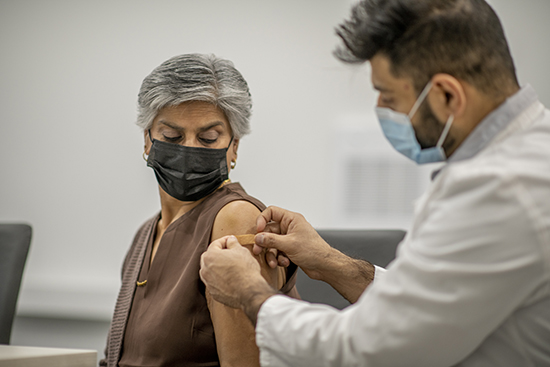
Should employers be encouraging vaccines for employees?
By Jack Burton
As organizations plan to ‘reboard’ staff, inoculation will be a factor

Conversations with employees surrounding vaccine encouragement and education occupy a complex and nuanced space. (FatCamera/Getty Images)
This story was originally published by Talent Canada, a sister publication to OHS Canada.
One of Canada’s first vaccine-related employment policies was announced this past week, with the Ontario government mandating that staff employed by long-term care homes must provide proof of full vaccination or medical exemption, or be required to undergo an educational program on the benefits of vaccination.
With COVID-19 cases entering a long-overdue downward trend — driven in large part by wider vaccine distribution — this light at the end of the tunnel is sure to inspire murmurs of return-to-office strategies.
As these strategies take shape, discussions surrounding vaccine policies in the workplace, akin to the new long-term care mandate, may become more commonplace.
“What we’re hearing from our clients is the issue of how and what one can say or expect employees to do when it comes to getting vaccinated,” said Cissy Pau, principal consultant at Vancouver’s Clear HR Consulting.
Handling COVID-19 vaccine hesitancy in the workplace
Advertisement
Safety vs. privacy
Conversations with employees surrounding vaccine encouragement and education occupy a complex and nuanced space.
Pau highlighted that not only are vaccines an issue of both workplace safety and employee privacy, but for many provinces, they are also one of the primary factors in making return to work possible in the first place, due vaccination rates’ role in reopening plans.
Because of the impact and importance that company vaccine encouragement can play in impending back-to-work policies, Pau advocated making vaccination discourse a part of back-to-work discussions with staff.
“Having regular communications about returning to the office and restart plans opens up the degree to which they revolve around vaccination rates,” Pau said, “which gives employers an opportunity to highlight the importance of vaccines.”
To properly begin these conversations, Pau recommended that organizations forgo any mandatory protocols and instead make vaccine initiatives “about encouraging and discussing the benefits behind getting the vaccine, and what can be done once people are vaccinated and what the workplace will look like.”
OH&S factors in policy
The influence employers have in encouraging their workforce to get vaccinated creates a responsibility that goes beyond just working toward reopening into a new normal, according to Norm Keith, partner at Fasken in Toronto.
“There’s a great deal of responsibility, but also legal liability on employers to make the workplace safe,” Keith said. “As things open up, with vaccination, the question becomes: does an employer fulfill its occupational health and safety law duties fully if it does not have a strong vaccination policy? I think the answer is no.”
When fulfilling the responsibility to develop a clear and actionable vaccine policy for one’s workplace, Keith echoed Pau’s insistency on an approach of strong encouragement over anything mandatory, along with prioritizing the privacy of one’s employees.
He also shared the importance of communicating how vaccine policies relate to your employees’ rights as a member of the workplace.
Medical or religious exemptions from vaccinations notwithstanding, simply refusing to take the vaccine for ideological or political reasons offers employees little legal protection, Keith said.
“’Don’t I have a right not to be told what to do with my body?’ Yes, of course you have a right, but also, if you don’t comply with the terms of employment, you don’t have a right to a job, either,” he said. “So, nobody has to get vaccinated, but the issues aren’t about an employee’s rights, it’s about compliance with a reasonable employer policy.”
Ultimately, Keith believes that the vaccine’s efficacy in protecting employees from hospitalization and death due to the spread of COVID-19 makes a vaccinated workforce an essential facet of safe occupational environments moving forward.
“Is there the odd side effect? Yes. Should you get medical assessment if you’re in a higher risk group? Absolutely,” said Keith.“But if you take the vaccine, you’re guaranteed to not get sick to the point of being in the hospital or dying. Does that help to cultivate worker safety? Of course it does.”
Jack Burton is a freelance writer in Toronto.